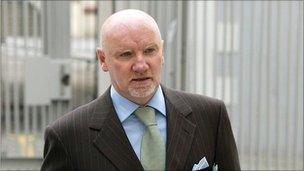Improvement in Scotland's start-up rate
- Published

More people started their own business in Scotland last year, according to the entrepreneurship survey
An increase in entrepreneurial activity has seen Scotland moving up the international league table, according to new research.
The Global Entrepreneurship Monitor 2012 found that total early-stage entrepreneurial activity (TEA) in Scotland rose last year.
It said activity matched the average for 20 innovation-driven economies.
However, it said Scotland needed a unified approach to entrepreneurship to capitalise on the rise.
The research, undertaken by the Hunter Centre for Entrepreneurship at the University of Strathclyde, also suggested that the country now had a higher start-up rate than the "Arc of Prosperity" smaller countries of northern Europe, which had been seen as a target for Scotland to emulate.
However, the improvement in Scottish figures lags significantly behind those of the UK as a whole, which has moved into the top quarter of similar developed economies.
Scotland has now moved into the second top quartile. Only two years ago it had been in the bottom range, following a decade of declining activity.
'Encouraging sign'
Most of the Scottish improvement in the TEA rate is among graduates, but often with little aspiration for growing their firms or employing more people.
It is particularly strong among migrants into Scotland. A third of the improvement in Scottish rates is explained by migrants bringing their enthusiasm for forming businesses into the country.
Around a 10th of Scotland's early-stage entrepreneurs are from outside the UK - double their share of the population.
And there is evidence that Scotland is losing much potential. Professor Jonathan Levie, director of the Strathclyde research, said his calculations showed there may be as many as 40,000 early-stage Scottish entrepreneurs who had moved to England.

Sir Tom Hunter believes the entrepreneurial support network is finally being integrated in Scotland
He said the priorities for action included improving the finance for growth, more effective connections between new businesses, helping people get the skills to grow their companies, improving the role of universities in supporting students and graduates, and improving the profile of role models.
However, Professor Levie, from the Hunter Centre for Entrepreneurship, said the increase in entrepreneurial activity in Scotland was an encouraging sign.
"However, it is mainly due to a jump in low aspiration start-up activity by graduates and we need a 'Team Scotland' approach to both raise and fulfil aspirations," he said.
"As a result of the financial crisis, more highly-qualified people have started businesses.
"Many of these individuals would not ordinarily have considered this option."
Prof Levie added: "The challenge now, as the UK economy recovers, is to encourage them to grow their business and not abandon it for a full-time job outside Scotland."
Sir Tom Hunter, who endowed the Hunter Centre for Entrepreneurship at Strathclyde, said Scotland had seen a steady rise in its TEA rate over the past three years but still lagged behind the UK as a whole.
'Cultural shift'
He added: "Ultimately it seems we need to continue the cultural shift towards enabling our people to recognise entrepreneurialism as a real career option.
"We are in the teeth of a recession but when I started out in a similar recession there was very little by way of support.
"Today it's different and I really do believe that we are finally integrating the support network for aspiring entrepreneurs."
The Global Entrepreneurship Monitor report analyses entrepreneurial attitudes, activity and aspirations as well as the factors that underpin them.
Finance Secretary John Swinney welcomed the figures and said they added to other good news for Scotland's economy announced this week.
He added: "Entrepreneurialism is a key driver in our aim of building a wealthier and fairer Scotland.
"It is fantastic news that Scotland now has more entrepreneurs than ever before and that we are now in the top half of the world's most innovation-driven nations but the Scottish government knows that more can be done."
- Published22 February 2013
- Published19 October 2012
- Published25 June 2012